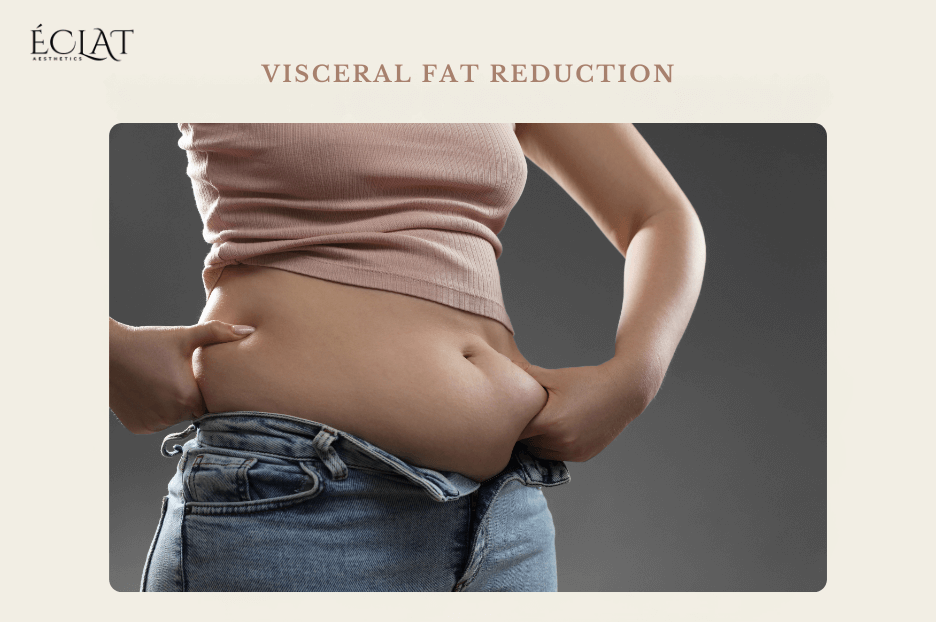Losing weight is about far more than fitting into an outfit or stepping on a scale. It’s about improving metabolic health, increasing energy, reducing disease risk, and crucially building sustainable habits that support long-term wellbeing.
Yet too many people find themselves stuck in a frustrating cycle of dramatic, short-lived “diets” and quick fixes. That’s where Éclat Medical Aesthetics in Alpharetta, GA steps in. Our medical weight loss program takes a science-backed, personalized approach delivered under medical supervision to help you achieve safe, durable results instead of temporary changes.
This article explains why medical weight loss works better than fad diets and what you can expect from a safe, effective program at Éclat Medical Aesthetics in Alpharetta, GA.
Difference Between Medical Weight Loss and Fad Diets
Fad diets promise fast results using rigid rules like cutting entire food groups, extreme calorie restriction, or miracle “cleanse” products. They’re typically unsupervised, one-size-fits-all, and focused on short-term scale loss.
Medical weight loss is a personalized, clinically driven program led by healthcare professionals. It uses evidence-based interventions (structured nutrition plans, physical activity guidance, behaviour change coaching, body composition monitoring, and, when appropriate, prescription medications) and emphasizes safety, metabolic health, and sustainable habits.
The difference isn’t just semantics. Medical programs aim to reduce fat while preserving lean mass, address underlying contributors (sleep, hormones, medications, mental health), and set up long-term maintenance.

Why Fad Diets Fail (and Can Sometimes Harm)?
Fad diets often deliver rapid weight loss initially, but three major problems make them poor long-term solutions:
1. Metabolic Adaptation and Weight Regain (the “yo-yo” effect)
When you sharply restrict calories, your body reduces resting metabolic rate and increases hunger hormones—physiologic responses designed to protect against starvation.
After the diet ends, many people regain weight, sometimes surpassing their starting weight. This cyclical pattern (weight cycling) has been linked in studies to worse cardiometabolic markers and psychological stress.
2. Nutritional Deficiencies and Loss of Lean Mass
Many fad plans restrict entire food groups or don’t provide balanced micronutrients. Rapid weight loss can include significant loss of muscle that is something we want to prevent because lean mass supports metabolism and function.
3. Lack of Individualized Strategy and Support.
Fad diets typically ignore medical history, medications, lifestyle constraints, and emotional eating drivers. Without coaching and monitoring, adherence crumbles and relapse follows.
Public health authorities repeatedly caution against extreme diets and recommend structured, sustainable approaches instead. The CDC and other agencies emphasize balanced eating patterns and sustained lifestyle change rather than quick fixes.
Is Medical Weight Loss Effective? | Scientific Answer
There’s strong, reproducible evidence that structured lifestyle programs supervised by medical teams produce clinically meaningful weight loss and health benefits:
- The Diabetes Prevention Program (DPP) demonstrated that a structured lifestyle intervention (goal: 7% weight loss + ≥150 minutes/week of activity) reduced the incidence of type 2 diabetes by ~58% in high-risk adults. This is a landmark example of how behavioural, supervised weight programs produce durable health outcomes.
- Systematic reviews of behavioural lifestyle interventions show consistent, clinically meaningful weight loss (e.g., average ~5% weight loss) when programs include frequent feedback, coaching, and structure. These programs also improve blood pressure, lipids, and glycemic markers.
- Trials of modern anti-obesity medications (GLP-1 receptor agonists and newer agents like Tirzepatide) show substantially greater weight loss than lifestyle alone for many patients, with significant improvements in cardiometabolic risk factors.
Taken together supervised, multi-component programs sometimes combined with medication produce better, more durable results than unsupervised fad diets.
Key components of an effective medical weight loss program
A high-quality medical weight loss program integrates five core domains:
1: Medical Assessment and Monitoring
Baseline labs (glucose, lipids, thyroid, liver enzymes), medication review (some drugs promote weight gain), and assessment for secondary causes of obesity are essential. Programs medically supervise progress and safety.

2: Individualized Nutrition Plan
Rather than one prescriptive “diet,” clinicians tailor macronutrient balance, portion strategies, and realistic meal plans to the patient’s preferences, culture, and schedule—ensuring adequate protein to preserve muscle.
3: Physical Activity and Strength Training
Exercise supports cardiovascular health, fat loss, and lean mass preservation. Strength training is particularly important to maintain resting metabolic rate during weight loss.
4: Behavioural Support and Coaching
Frequent counselling (in-person or remote), self-monitoring, problem-solving therapy, and relapse prevention are the behavioural backbone that sustains change. Evidence shows that structured coaching increases weight loss and maintenance.
5: Pharmacotherapy (when Indicated)
Under medical supervision, prescription medications (GLP-1 receptor agonists) may be used to augment lifestyle measures. These medicines are most effective when combined with counselling and monitoring.
Your Healthier Future Starts Here
Our team in Alpharetta combines medical expertise and evidence-based therapies to help you lose weight safely and sustainably. We provide practical guidance on nutrition, exercise, sleep, stress management, and behavior change empowering you to make healthier choices that fit your life.
Medications and Modern Therapies
In the last decade, the pharmacologic landscape for obesity has changed dramatically. Newer agents produce substantial, clinically meaningful weight loss when used properly with lifestyle change.
GLP-1 Receptor Agonists (e.g., Semaglutide) and Dual Agonists (e.g., Tirzepatide)
These drugs act on appetite regulation centers, slow gastric emptying, and improve satiety. Clinical trials show impressive weight-loss percentages and metabolic benefits. Some head-to-head data (e.g., recent trials) suggest Tirzepatide may offer greater mean weight loss than semaglutide in certain populations. When integrated into a medical program, they can help patients reach health-related weight goals that were previously much harder to achieve.
It’s important to know that weight-loss medications need medical supervision because they can have side effects like stomach upset, gallbladder problems, and other rare risks. They’re not a cure on their own and work best when combined with healthy eating and behavior changes. New oral options look promising but also need proper guidance from a healthcare provider.
Behavioural and Lifestyle Interventions
Weight management is not just a biology problem; it’s deeply behavioural. Behavioural programs build skills for real-life decisions:
- Self-monitoring (food logs, weight tracking) raises awareness.
- Stimulus control and environment changes reduce triggers for overeating.
- Problem-solving and relapse prevention teach how to handle setbacks.
- Motivational interviewing helps patients commit to change consistent with their values.
- Structured curricula (like DPP-style programs) produce meaningful health improvements including weight loss and decreased progression to diabetes.
Body Composition and Metabolic Health
Focusing solely on scale weight misses key health aspects:
Fat vs. Muscle:
Medical programs aim to reduce fat while preserving or increasing lean mass. Preserving muscle supports function and metabolic health.

Visceral Fat Reduction
Small changes in visceral fat (the fat around organs) substantially reduce cardio metabolic risk even when overall weight loss seems modest.
Metabolic Markers Matter
Improvements in blood pressure, A1c, triglycerides, and waist circumference often accompany medically supervised weight loss—these are better predictors of health than weight alone.
Medical weight-loss programs routinely use body composition analysis and labs to track meaningful improvements beyond the number on the scale.
Safety, Monitoring, and Individualized Care
Medical programs offer several safety and quality advantages over fad diets:
- Medical screening for contraindications (e.g., cardiac, thyroid, or psychiatric issues).
- Medication oversight, dose adjustments, and side-effect management.
- Nutritional adequacy checks to prevent deficiencies.
- Customized plans for pregnancy planning, poly cystic ovarian syndrome (PCOS), or patients on multiple medications.
- Evidence-based escalation: when lifestyle alone isn’t enough, the program can safely integrate pharmacotherapy or refer for bariatric evaluation.
This safety net reduces avoidable complications and helps patients achieve outcomes without risking harm.
Realistic Expectations: Timeline, Plateaus, and Maintenance
A successful program sets realistic timelines:
- Early phase (0–3 months): Most patients see the largest rate of weight loss here with close support and, when used, medication initiation.
- Middle phase (3–12 months): Continued progress but typically slower as the body adapts. Skill-building and habit formation are priorities.
- Maintenance: The goal is sustainable habits. Many programs recommend ongoing, less-frequent follow-up (monthly to quarterly) to prevent regain. Long-term maintenance is the hardest part and where medical programs provide the most value by offering structured follow-up, reinforcement, and re-intervention if necessary.
Weight-loss plateaus are normal. Your medical team can adjust your diet, activity, or medications to get you back on track instead of letting old habits return.
Medical Weight loss Program at Éclat Medical Aesthetics
At Éclat, our medical weight loss approach blends medical expertise with compassionate coaching and modern tools. A typical pathway includes:
- Comprehensive intake & medical assessment: History, labs, meds review, and goal setting.
- Guidance That Empowers You: Our team helps you understand real food strategies, protein goals, effective exercise approaches, sleep improvement, stress management, and behavior changes so you can build lasting healthy habits.
- Evidence-based tools: we use validated monitoring (weight and body-composition tracking), structured coaching sessions, and prescribe medications when appropriate and safe.
- Regular follow-up and adjustments: weekly or biweekly touch points early on, transitioning to monthly maintenance once stabilized.
- Integration with aesthetics & support services: because weight, body composition, and skin/appearance interact; our team can coordinate complementary medical aesthetic treatments safely if desired.
This medicalized, integrated approach helps patients lose fat, preserve muscle, improve labs, and most importantly build habits that stick.
Practical Tips if you’re Considering Medical Weight Loss
- Choose a program with medical oversight. Look for programs with credentialed medical staff.
- Demand individualized plans. Avoid cookie-cutter “one-size” diets.
- Ask about behaviour change support. Coaching and accountability predict success.
- Discuss medications openly. Understand benefits, side effects, and how meds fit into long-term plans.
- Prioritize metabolic health over scale obsession. Improvements in A1c, blood pressure, and energy matter more than a number alone.
Myths and Misconceptions
- “Calories are the only thing that matters.” True, energy balance matters—but hormone effects, satiety, nutrient density, sleep, and activity influence calories in/calories out. A medical program accounts for all of these.
- “Medications are cheating.” When used appropriately, medications are tools—like insulin for diabetes—that help correct physiologic drivers of weight and improve outcomes.
- “If I lose weight fast, it’s healthier.” Rapid weight loss may mean more muscle loss and nutrient deficiencies. Clinically guided programs emphasize safe rates and lean mass preservation.
Cost-Benefit: Investing in Lasting Health
While medical programs often cost more initially than a self-directed fad diet, they yield better health returns, fewer comorbidities, improved biomarkers, reduced medication needs for related conditions, and less cycling between weight gain and loss. In many cases, the upfront investment prevents much higher downstream costs associated with unmanaged obesity (cardiovascular disease, diabetes complications, etc.).
How Éclat Supports long-Term Maintenance?
Maintenance is the hardest phase. Éclat supports retention of weight loss through:
- Periodic check-ins and refresher coaching
- Re-assessment of medications and doses
- Adjusting nutrition plans for life changes (pregnancy planning, travel, career shifts)
- Offering community, group sessions, or remote touch pointsto sustain motivation
Beyond the Scale: Improving Your Whole Self
Fad diets sell a story: quick fix, dramatic before/after pics, and a promise that life will be simpler. The reality is more nuanced and better. Medical weight loss is a durable, safe, and evidence-based path that treats the whole person: biology, behaviour, and lifestyle. With clinically supervised plans, modern therapies, and consistent coaching, sustainable weight loss and improved health are achievable goals.
If you’re tired of the dieting roller coaster and want a program built on evidence and compassion, Éclat Medical Aesthetics in Alpharetta, GA offers individualized medical weight loss solutions that prioritize long-term health and confidence.
Transform Your Health, Not Just Your Weight
Ready to stop the cycle of fad dieting and build a sustainable path to better health? Schedule a consultation with our medical weight loss team at Éclat Medical Aesthetics today. We’ll assess your health, review lab work, and develop a personalized plan.
Frequently Asked Questions
How is Medical Weight Loss Different from a Regular Diet?
Medical weight loss is supervised by healthcare professionals who tailor a plan to your body, medical history, and goals. Unlike fad diets, it focuses on long-term health, safe weight loss, and building habits you can maintain.
How Quickly will I See Results?
Everyone is different, but most people start noticing changes within the first few weeks. Safe, sustainable weight loss is typically 1–2 pounds per week. Our team monitors your progress and adjusts as needed.
Is Medical Weight Loss Safe?
Yes. Because the program is guided by medical professionals, you’re closely monitored for side effects, nutritional adequacy, and progress. This is one of the biggest advantages over unsupervised diets.
Will I Regain the Weight after the Program?
Our focus is on helping you develop healthy, sustainable habits. With ongoing support and maintenance plans, you’re far less likely to regain the weight compared to going it alone.

